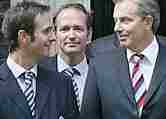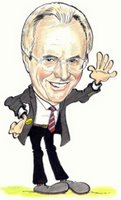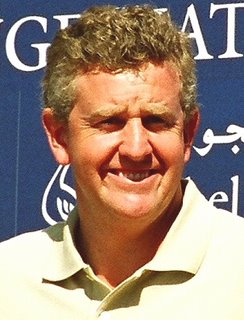
At
At
And so to
And so to
© Paddy Briggs December 2006

At
At
And so to
And so to
© Paddy Briggs December 2006


The repercussions of Sunday’s extraordinary events at The Oval will be felt in cricket for a long time. Tribune sports columnist Paddy Briggs was at the ground – here is his special report.
The blatant and very public attempt by the two cricket Board chairman to undermine the decision that the umpires had made and try and get play restarted is perhaps the most shocking part of this whole sorry event. Remember these two men are not just the most senior cricket administrators in their respective countries, they are also both personally members of the International Cricket Council’s (ICC) executive board. To their great credit the umpires, Billy Doctrove and Darrell Hair, (both ICC employees, of course) refused to be intimidated and refused to be party to the squalid little deal that Morgan and Khan had brokered with the Pakistan team. It was the umpires’ entirely honourable decision not to stand in any restarted match which finally scuppered the match for good.
Passions are running very high at the moment and a period of calm would be welcome whilst the ICC looks closely at the whole affair (as they must). But it is important to state from the outset that, as in any sport, play can only happen if there is a framework of rules which delineate the limits of behaviour and which clearly decide who is in charge. The Laws of cricket certainly do this and these Laws are backed up by the ICC’s 8,700 word document “Standard Test Match Playing Conditions”. Reference to these Laws and conditions shows that the
The root cause of Sunday’s Oval fiasco was a lack of proper leadership when it mattered most. Inzaman-Al-Haq should have said to his players “Look guys we are not happy about the ball-tampering allegations but the right time to progress this is after the match. Let’s get on and win it”. When he failed to do this Bob Woolmer or Zaheer Abbas or the ineffable Shaharyar Khan should have stepped in and said something similar. Instead there was vacillation and they all bowed to player power. Inzy has built a strong team with his distinctive brand of captaincy and it is quite clear that his players would do anything that he asked them. But it seems that in initiating the “protest” he put the rather arrogant conviction that he and his players had the moral high ground above common sense. And a match which could, and should, have ended with
Among my collection of “Wisden’s Cricketers Almanack” (that famous yellow bound book that is eagerly awaited every year by all cricket fans) are some thin editions which record the English seasons between 1940 and 1945. Although there were other priorities than cricket at that time the game was not entirely suspended and matches took place from time to time all around war-torn

The idea that you can “keep politics out of sport” is as absurd as the idea that you can “keep sport out of politics”! Politicians of all colours will happily bask in the reflected glory of national sports team successes – the doors to presidential and prime ministerial offices are always open when a photo opportunity with a trophy winner presents itself.
So if sport is part of life (as it is) surely it should operate within the same moral imperatives as other parts of life? Why give succour to vile regimes which have abandoned any pretence to human rights and universal values by playing sport with them? And it is not just the canny politicians in the West who will happily use sport to their advantage when they can. History teaches us that most dictators love to parade their power in front of large crowds when they can create the opportunity - so when Hitler took the salute at the Berlin Olympics in 1936 it was a barefaced promotion of his power and of the “glories” of the Third Reich. In a couple of year’s time the Central Committee of the Chinese Communist Party will be doing much the same in

For the "Bahrain Tribune"
England bowler Steve Harmison checked out of his hotel room last Sunday morning which, with ten Pakistan second innings still be taken and three days of the match nominally still to go, was an act of supreme self-confidence. Harmy's confidence was well justified and together with the excellent Monty Panesar, he bowled England to a comprehensive three-day win. I hope that Harmison enjoyed Sunday evening back home with his feet up and surrounded by his family - he certainly deserved to.
Tiger Woods win in the "Open Championship" was, as I commented last week, founded on a superb game plan and excellent course management. But it was also driven by self-confidence bolstered by the fact that the game plan was clearly working. The more you do something, and do it well, the more likely you are to be able to continue doing it well. The more that you are outfought or outwitted by your opponent the more that self-doubt creeps in and you begin to wonder if you will ever win again. There has been a touch of that in the England cricket team since last year's "Ashes" triumph. Missing key players (which has reinforced the self-doubt) and with some of their better players searching for form England has under-performed. When these doubts were conquered (as at the Mumbai Test match when England took advantage of the good fortune of being invited to bat first on a good pitch) they have played to their potential. But when the doubts have crept in (as during most of the home Sri Lanka series) the performances have been sub-standard. At Old Trafford last week the "old" England turned up to play and with Harmison firing well, Monty fizzing the ball off the hard wicket and a couple of young batsman (Cook and Bell) playing really well an innings victory was assured. The challenge is now to build on the self-belief that this win will have engendered and go on to clinch the series at Headingley - don't bet against it!
Self-belief was also to the fore at Hockenheim on Sunday when Ferrari sailed to a brilliant one, two in the German Grand Prix. There were paddock rumours before the race of discontent in the Renault camp - something that I predicted might happen in my pre F1 season preview. Flavio Briatore, the Renault chief, is a flamboyant character and a brilliant tactician as well. Flavio bows to nobody in his knowledge of the sport and in knowing how to convert that knowledge into race victories. But Flavio's self-confidence turns to arrogance rather more than his rivals at McLaren and Ferrari - that is how he lost the services of Fernando Alonso at the end of last season and that is the reason that his grip on the 2006 championship may be weakening. Whereas Ferrari is clearly on a roll - the smiles on the faces of Schumacher and Massa on the podium were smiles of genuine pride rather than relief - Renault is visibly slipping. Alonso is getting edgy and Flavio angry, and that is not good news for the Renault fans. Ferrari, on the other hand, is marshalling all their considerable resources to push for a final championship for Schumi - and to launch a new era for the Scuderia without him - on a high note.
It is sometimes forgotten that in a sport that is so much about the familiar faces of the great champions (Fangio, Clark, Stewart, Prost, Senna and Schumacher) that behind each champion there has to be a formidable team. When doubts creep in to the team (last year's under-performing Bridgestone tyres at Ferrari, for example) then winning is difficult. But when self-belief is all around, as it was with Renault last year and seems to be with Ferrari now, then success becomes almost easy!


The tale of Zinedine Zidane’s Football World Cup 2006 (prior to the Final) was told in my
As we saw at
At its most trivial level fame and fortune can make top sportsmen just very silly. All the hype over the celeb footballers and their shopping addicted WAGS (Wives and Girlfriends) is harmless, if vulgar. But the blacker side of this coin is when the same fame can lead a man to think that he is above the law and whether that tendency is truly horrific (like O.J.Simpson) or just grotesquely foolish (Zidane) it does not show human nature at its best. But for every Zidane or Rooney there is a Federer or a Nadal (excellent role models both) – so all is perhaps not lost!

The challenge for the coach in any team sport is, above all, to make the whole greater than the sum of the parts. Sometimes a great coach will be able to work with a group of players each of whose individual ability might be modest but who he can mould together into a formidable team unit. In football we have seen this in recent times with the remarkable Dutch coach Guus Hiddink who took
Sven-Goran Eriksson, the
There are three key requirements of any good coach. The first is to pick the best players. The second is having the technical understanding of the sport to introduce the right tactics (team formations etc.). And the third, and most crucial, is to motivate the team to perform over and above their individual abilities - to make the whole greater than the sum of the parts. Over most of his tenure Sven-Goran Eriksson failed on all three counts, but most culpably at the 2006 World Cup a tournament which, given the quality of the players available, England could well have won. Sven’s selections were bizarre – most obviously bringing four strikers of whom two (Rooney and Owen) were far from match fit, one (Walcott) who had never played a top class match of any sort and the fourth (Crouch) who is also comparatively untried at the top level. Eriksson compounded his odd squad selection with tactics which were inconsistent and eccentric. Instead of having a clear idea as to what the coach wanted long before the team arrived in
But it was on the third requirement that Eriksson was most deficient. He could not motivate the players to perform well – and most of the time he seemed not to try.

I certainly hope that Colin Montgomerie can summon up the necessary strength of character to win a Major – perhaps next month in The Open Championship at Hoylake? It is, I think, all about character not really about technique or natural ability (both of which he has to a very high level). If the conditions are right, and with a friendly crowd behind him, Monty might just break his duck in The Open. I hope that he does - not because he “deserves” to win, but because a player of his talent and one who (despite the odd ups and downs) has brought great credit to the game would be a worthy champion. Montgomerie himself certainly knows that you only win when you play at least one stroke better than the next man, not because the gods have decreed that you “deserve” your turn. Mind you, as always in golf, luck plays its part and if Monty needs the odd lucky bounce along the way few but the churlish would begrudge him that good fortune!

The Football World Cup, by far the oldest established of the quadrennial sporting tournaments (the Olympics aside), has never produced a surprise winner, which is curious given the nature of the game. Soccer, with its low scoring, is a game in which upsets often do occur with underdogs winning against the odds. The last European tournament was won by Greece who were rank outsiders at the start - could this be a precedent for a similarly unfancied team to win in Germany? After the first ten days of the Group stages this looks unlikely - although a number of the lesser teams have performed creditably at times. The Ivory Coast, Paraguay, Trinidad, Angola and (especially) Ecuador and Australia have worried the more fancied teams. There are few really poor teams amongst the 32 and it could well be that two more of the "minnows" (Australia and perhaps Angola) will join Ecuador in the second round. My record as a tipster is not one to follow too closely - but if I was to choose a dark horse candidate to go even further it would be Australia, not only because they have some very good players but because we all know that the Aussies are tough competitors in every sport in which the take part. The "Socceroos" have a few points to prove, as their breed of football is well behind the other codes (Rugby Union, Rugby League and Aussie rules) in Australian esteem.
The Football World Cup is a magnificent event - a month packed full of football with hardly an irrelevant match in prospect. Compare that with the 16 nation Cricket World Cup which lasts two weeks longer and which incorporates a plethora of unnecessary games just to keep the sponsors and the broadcasters happy. But then Football is truly a world game (the only one) whereas cricket, despite the efforts of the ICC, has still to spread out significantly from its base in the old Test cricket nations.
In England there is huge interest and a palpable feeling that the national team might just be able to repeat their 1966 success. Having made the second round they certainly have a chance despite bad luck (the injuries to Owen and Neville) and the eccentric squad and team selections made by manager Sven Goran Eriksson. Forty years ago the late Alf Ramsey revolutionised football by eliminating wings and concentrating on midfield domination as the key to success. Alf's "wingless wonders" (as they were called at the time) did however have some formidable goal scorers in Hurst, Hunt and Charlton. Eriksson seems to have taken Ramsey's model a stage further by only fielding two strikers and then (in the game against Paraguay) taking one of them off in the 55th minute! If this is all part of some predetermined cunning plan on the part of the enigmatic Swede most commentators say that they can't see one. You don't win tournaments without scoring goals and you don't score goals by leaving many of your best strikers back home in England. The folly of this decision has been brought into sharp relief by the Owen injury and by the fact that Wayne Rooney is clearly not match fit. At his best Rooney is up there with Ronaldhino, Ronaldo and Henry as a finisher - a footballer of quite exceptional talent. But he is unlikely to be able to keep going for 90 minutes and is (understandably) not yet at his sharpest. This leaves Eriksson with the rather weird Peter Crouch (who has yet to convince) and the untried teenage Theo Walcott as a potential strike force. If Sven has a plan to cope with this problem then that it is probably to rely on goals from his excellent midfield unit of Gerrard, Terry, Lampard and Beckham. It might just work.
I have a feeling about the 2006 Football World Cup that it will be an attacking and bold team that wins it - and in that respect Germany, Argentina and (especially) Spain look the pick of the bunch. Never write off the Germans - you would expect a team managed by the great Jurgen Klinsmann to attack, and so it is proving with eight goals in their first three games. Germany v Argentina and Spain v Brazil (two of the likely Quarter-Finals) will be games not to miss!

 There was some surprise when the modest David Daffodil replaced the abrasive Lord Tesco as head of the English Cricket Council (ECC) - some said that his previous experience ruining (surely "running"? Ed) a small Welsh company "Merthyr Tydfil Widgets" would ill equip him for the task. But Daffodil soon surprised the critics with his eloquence and intelligence. A towering orator Daffodil has often been compared with fellow Welshmen Lloyd-George (Glamorgan 1901 - 1931) and Bevan (Australia 1996-2004). When questioned about the ECC's controversial decision to award cricket rights to a satellite broadcaster he commented incisively "You can't get Channel Four in the Vale of Glamorgan at all, so this is much better for all of us". The Iraq affair caused Daffodil some sleepless nights but he built a good relationship with Malcolm Crack of World Cricket who described him as "A man of great integrity with whom I always enjoy discussing things before I tell him what to do".
There was some surprise when the modest David Daffodil replaced the abrasive Lord Tesco as head of the English Cricket Council (ECC) - some said that his previous experience ruining (surely "running"? Ed) a small Welsh company "Merthyr Tydfil Widgets" would ill equip him for the task. But Daffodil soon surprised the critics with his eloquence and intelligence. A towering orator Daffodil has often been compared with fellow Welshmen Lloyd-George (Glamorgan 1901 - 1931) and Bevan (Australia 1996-2004). When questioned about the ECC's controversial decision to award cricket rights to a satellite broadcaster he commented incisively "You can't get Channel Four in the Vale of Glamorgan at all, so this is much better for all of us". The Iraq affair caused Daffodil some sleepless nights but he built a good relationship with Malcolm Crack of World Cricket who described him as "A man of great integrity with whom I always enjoy discussing things before I tell him what to do".





